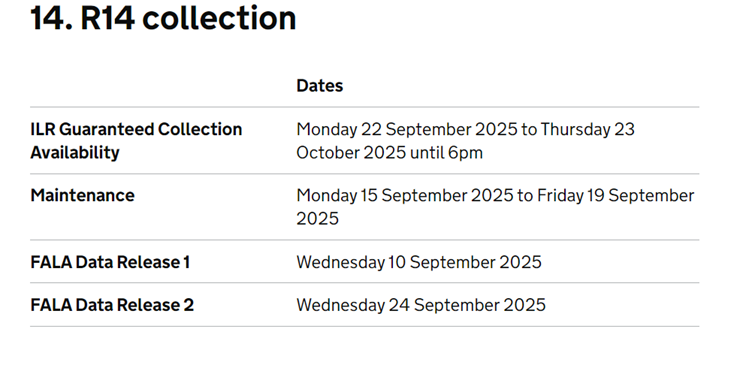With the 2023/2024 academic year behind us and the dust settled from the R14 submissions, providers can take a moment to reflect and regroup. As we look ahead to the 2024/2025 academic year, it’s the perfect time to start preparing to ensure a smooth R14 process next year. This article explores practical strategies and tools to streamline your ILR submission processes with the help of Aptem.
What is R14, and why is it important?
The final ILR submission of the academic year is known as R14 or ‘hard close’ because once the R14 deadline has passed, providers cannot make further amendments to their data for the previous academic year. The accuracy of provider data in its R14 submission is essential, as any inconsistencies can suggest that you have been overpaid by the ESFA, resulting in a clawback of funding.

Strategic planning and preparation
One of the key factors in a successful year-end lies in strategic planning and preparation throughout the year. There are several elements of your apprenticeship business that you should consider to help you prepare for your next ILR submission.
Funding rules and compliance documents:
Review compliance documents, including verifying updates in funding rules and any additional information required from stakeholders, such as commitments from the provider or employer. Keeping these documents and templates current helps maintain compliance.
New versions of standards/qualification criteria:
Consider any upcoming changes to standards, qualification criteria, and curriculum delivery. To ensure these updates are accommodated within Aptem, submit your requests to the Aptem Team via Zendesk in the Aptem Help Centre four to six weeks in advance (or up to eight weeks during busy periods).
Onboarding and delivery programmes:
Is there any change in your curriculum delivery? Are there any changes to the content in your programmes or learning plan components? Do you need to reconsider your gateway reviews and EPA information? These are all things to consider before year end.
Version Control:
Implementing version control for reviews and competencies avoids loss of data integrity. It provides a clear historical record of changes and updates and allows you to keep a copy of the original.
Account management:
Regarding your admin, learner, and employer accounts, ensure you’re archiving any business leavers. If any Aptem Champions or Superusers leave the business, ensure that other people have been retrained to cover these roles to help you make the most of your Aptem usage.
Leveraging Aptem functionality
Aptem offers a suite of features that simplify your preparation for R14.
Quality Power BI report
This report helps providers understand their data throughout the year, removing some of the complexities of R14 preparation. Providers can gain an indication of their QAR for the last two years and performance in the current year. It includes a summary of completed and in-learning learners. The in-learning learners are critical as they will impact whether you achieve the minimum expected or maximum QAR rates. You can filter the report to get a list of learners that need to complete before year end, allowing you to target support to the relevant learners.
To avoid end-of-year rushes and prevent unexpected financial complications, we encourage in-year management of your Power BI reports rather than waiting until year-end and then looking at your QAR reports and accountability framework. If you spot any data queries, report them immediately to the ESFA.
Watch this part of our webinar on preparing for your ILR submission and the new academic year in Aptem to learn more.
Process automation trackers:
Process automation trackers help you automate and optimise repetitive tasks. Ensure you process any automation trackers; we encourage this to be part of everybody’s workflow. If you’re responsible for creating, authorising, and processing your trackers, you should log in and check to see if any new ones are coming through for yourself.
You don’t want to be caught out with any outstanding trackers before going into R14. Ensure you are processing your trackers and that they have been cleared before going into the ILR every month to help keep your ILRs up-to-date.
Other recommendations and considerations from Aptem:
- Stay on top of Aptem updates with the help of our monthly release notes, which are available in the Help Centre and product roadmap.
- Catch up with our regular product briefing webinars to learn best practice tips.
- Consider changes in business processes – following any updates in Aptem, have you considered any changes that are necessary for your business processes? If the change is in Aptem, do you continue to do things the same way? Is any training required for your staff following these changes?
- Are you maximising the potential of the roles of your Aptem Champions and Superusers? Their role is to support your changes and the functionality and development of Aptem to provide any additional training you need.
- Ensure staff training documentation is kept current and develop internal FAQs for any common issues.
- If there are any changes to Aptem, we recommend creating an action log to ensure you are keeping a record of the changes. Then, use that as development going forward within your system, and attend meetings with your CSM, champions, and superusers.
- Many providers use group structures to exclude groups or stop learners from going into the ILR. This is particularly useful if you’re moving learners between programmes.
As we move forward from the previous academic year, strategic planning, leveraging an apprenticeship management platform like Aptem Apprentice, and maintaining data integrity remain crucial. By adopting these strategies now, training providers can ensure a smooth R14 submission for the 2024/2025 academic year.

